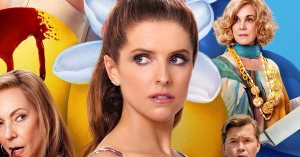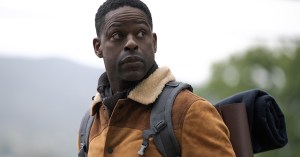Calvary‘s Brendan Gleeson: The RT Interview
Brendon Gleeson is the kind of actor who can add gravitas to virtually any role. The Irish actor is probably best known to multiplex audiences for his performance as Professor Alastor “MadEye” Moody in the Harry Potter films; for indie types, he’s fondly remembered for his work in black comedies like In Bruges and The Guard. This summer, Gleeson can be seen in the Tom Cruise sci-fi adventure Edge of Tomorrow, and Calvary, his latest collaboration with writer/director John Michael McDonagh, in which he plays a small town priest who tries to keep his faith in the midst of a decadent, sinister community.
Gleeson talked to RT about the dark power — and moments of levity — in Calvary, as well as his philosophy on taking parts in more mainstream films, and his role in the forthcoming Ron Howard film Heart of the Sea, based on the remarkable true story of a whaleship crew stranded in the Pacific Ocean after a whale attacked their ship.
Rotten Tomatoes: It’s interesting to see a film like Calvary that features a priest who isn’t performing exorcisms or something like that.
Brendan Gleeson: I think it’s a very unusual character in the sense that he’s not an anti-hero — he’s actually a hero, which is unusual today. But he’s a hero and a very complicated and flawed one. So he’s also a lot to answer for in terms of his cloth, and there’s no attempts to hide the damage that has been done by people of his church, and he’s expected to respond to it. I think we’ve grown used to anti-heroes and it’s unusual now to get a fairly involved examination of somebody who’s a good man.
RT: In your previous film with John Michael McDonagh, The Guard, you play a character who’s an authority figure, but he doesn’t really seem to take his authority all that seriously. In Calvary, you play a character whose authority has eroded in recent times, but he takes his mission very seriously by comparison.
Absolutely, yeah. [The Guard character] Gerry Boyle is a very lonely man and he has erected walls around himself, I think. You have to dig very deep before you find, you know, the goodness in him, which is undeniably there. I think the difference between the two of them [is that] Gerry Boyle has kind of more or less thrown in the towel, but I think he’s always waiting for the challenge that will allow him to rediscover that figure of authority and that kind of hero within himself. I think he welcomes it when it happens near the end. Whereas Father James starts out opening up to [a] kind of attack and more or less committing to seeing it through.
RT: Many of the Irish films that play in America stateside tend to focus on quirky characters in light comedies. These two films you’ve made with John Michael McDonagh have been slightly bleaker, though there’s a dark strain of humor in both of them. Do you feel like you have to sort of show a fuller range of what Ireland is like?
I’m not doing the evangelistic thing of the Irish sensibility or anything, it’s nothing like that. I think this deals with more universal issues. I don’t think disillusionment is kind of confined to the Irish. I think people are generally out of sync now with the authority figures. They don’t trust them. They feel betrayed by them. And I think that’s an almost universal experience. It possibly takes different forms in [the United States]. If you look at the people who vote, for example, there aren’t that many of them considering how many should be voting. So people are feeling detached and disillusioned from their leaders all across, certainly, Western culture. And then in the religious area, I think we’ve had those scandals in Boston and various places here too. I think the difference is possibly that church and state are separate here. The religious trauma is seen as separate to the state problem, the political problem, it seems it’s a different area, where in Ireland the two are intermingled to such an extent that one became undetachable from the other. But I do think the film is about things that are more than just the Irish situation. I think people feel let down by financers, by politicians, by priests, by all of the moral authority that is supposed to allow for the aspiration of the people to be focused and to be directed. People are discovering now a feeling of, “Can you trust anybody at the moment?” The fear is a distrust of that kind of moral authority. I think part of what the film says also is that if you take away that aspirational thing, and you relegate forgiveness and compassion and those kind of things, and a relevance for some sort of loser to engage in, or if your life seems kind of pretty barren and you become detached and ill at ease with yourself. So it’s kind of about, well OK, if you’re going to deject one form of authority, what are you going to substitute for it? How do you maintain your own aspirational optimism in the human condition? That’s what I think it comes down to.
RT: You’ve said that playing Father James took a lot out of you. You’ve also had smaller parts in larger films likeEdge of tomorrow. Is that sort of project like a holiday for you, or are you still trying to find the heart of your character?
Edge of Tomorrow, I actually really liked that film. My general rule of thumb over the last 20, 25 years is If given the opportunity, if I look over a year, I want [to be in one movie] that has undeniable artistic and creative heft, you know what I mean? Otherwise I feel I’m wasting my time. Once I have that either in the bag or I’m scheduled to fit something in that’s more challenging in that way — like this film for example or The Guard or In Bruges or The General or any of those things — when I feel I’ve been artistically challenged once in a year I kind of feel that, OK, I don’t want to miss the possibilities of what pure entertainment can do. I would never try to do rubbish or stuff that was insulting intellectually. I love the notion of being the general at the world against the aliens. I mean, why wouldn’t you like that? It’s Doug Liman, I’ve liked his films already. I think it’s a really smart movie, actually and I was so pleased the way it turned out in the end. I wasn’t quite prepared for how good it was going to be. So yeah, I try to balance it in the sense that, it’s a good thing to go and entertain people, and I think it’s a good thing as well if you’re going to do deeper film that you’re talking to people so you maintain that degree of entertainment within what you’re trying to do even in the more artistically deep films that you’re making. No point in talking to an empty seat. You take care to entertain at all times and then other times you have a chance to explore something a little deeper than others.
RT:You look at the description of something like Cavalry and it looks really grim, but you’ve said you wanted people to engage with it with an open mind.
I was hoping that there wouldn’t be a kind of campaign that would throw out as a black comedy as such, you know, because I think people really don’t forgive you for being, to label a film as something that it isn’t. I think the film stands on its own, it’s difficult to actually stick it into one particular genre. I think it’s a very serious film, but I think it’s hugely, massively entertaining as well. There have been very few people who have not connected with this. Some people are left cold by it, that’s all fine. But the vast majority of people who have gone in have engaged with it. And they don’t really talk for like the ten or fifteen minutes afterwards. I think that’s a massive achievement. It means that you have captured their imaginations and brought them into a journey that wasn’t easy, but they were given every chance to, you know, to be allowed to breathe during it, not to be detached from the film, to be, you know, part of the movement of the film. You work kind of hard at that. You don’t want to just throw stuff at people and expect them to man up and just take it. You’ve got to take responsibility for the entertainment element of things and to keep people interested and to work the dynamic of the film so that people, you know, stay in there until the end.
RT: You taught a Catholic school for a while. Did you find it to be similar to someone like Father James in the sense that people would sort of come to you with their issues, and you ended up doing some things other than your basic job?
Yeah, for sure. There’s a vocational aspect to it. And if you don’t actually like the kids? I went back a year or two afterwards and a guy said that some of the people forget that you have to actually like the kids to be in this job, you know. There’s a kind of vocational aspect to certain jobs — teaching’s one of them, nursing would be another — you can keep going on down the line. And it has to do with more than just the physical. You have to commit to the humanity that’s going to be [prepared] for this sort of element and to be available a little bit. It’s hard when people tend to only look at the bottom line when evaluating status. If you weren’t getting paid a fortune, you weren’t considered to have done much with your life. I think people really kind of missed out on a lot in valuing what good teachers can achieve. I had one phenomenal teacher in primary school who changed my life, really. I wouldn’t be doing this without him, I don’t think. I didn’t always get on in school, like in terms of, I was quite rebellious in my teens and I hated it and did all the usual stuff. And that guy still stuck with me. I think people can change other people’s lives and make differences. So yeah, I did actually like those kids, and I got a lot out of it. I hope I kind of served them as well as I could.
RT: You’re one of the stars of Heart of the Sea, which is based on an amazing story. What attracted you to it?
It was working with Ron Howard, basically. I play the cabin boy who was on the Essex, and he actually did write a version of it [the story]. The scenario is he was speaking with Herman Melville, who obviously was inspired by that story to write Moby Dick, and Melville is attempting to extract this story from him and my guy is sort of reluctant to part with it because there’s a certain amount of post-traumatic stuff that he’s never quite recovered from. So it was quite an intense time. I mean, I only spent about six days doing it, but there’s been a lot of contact since, because of the voiceover. We see the story from his eyes. It became quite intense, to be honest. I worked with Ben Whishaw, who’s playing Melville. We didn’t have to get our feet wet, but we certainly went into pretty heavy stuff at times. It’s going to be fantastic.
RT: Are you afraid of taking on all these really intense roles?
It does take its toll a little bit, so you have to be prepared for it. To be honest with you, in the last two years I’ve been kinda getting to the point where I’m going to choose my, I’m going to give myself more recovery period than I’ve been doing, because sometimes you can beat yourself up a little bit too much and think that you have a bottomless well. I want to just take a little bit of recovery time more than I used to.
Check out our previous interview with Gleeson here, and take a look at his complete filmography on Rotten Tomatoes. Calvary is currently in theaters in limited release.






